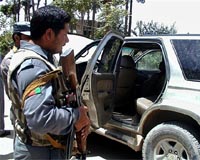 |
Rawalpindi, Pakistan (AFP) Feb 1, 2010 Pakistan's army chief said Monday his country had no interest in "controlling" Afghanistan, launching a robust defence of its policy across the border and fight against Islamist extremists. In a rare address to foreign media, General Ashfaq Kayani devoted much of his presentation to Afghanistan, at a time with Pakistan is under Western pressure to do more to combat militants fighting against NATO and US troops. Kayani, a former director of Inter-Services Intelligence, the spy agency at the heart of US fears that Pakistan is playing a double game, said peace and stability in Afghanistan were crucial to Islamabad's long-term interests. "We want Afghanistan to be our strategic depth, it does not imply controlling Afghanistan," Kayani said. The term "strategic depth" is used to describe Pakistan's efforts to counter the perceived threat from its arch-rival India by building up allies and a friendly government in Afghanistan, including the 1996-2001 Taliban regime. "The way we understand it, if Afghanistan is peaceful, stable and friendly, we will have our strategic depth because our western border is secure... no one has been able to control Afghanistan in that sense in its history." Kayani even offered Pakistani help in training Afghan security forces, a key plank of the US exit strategy after more than eight years of gruelling war against the Islamist insurgents in Afghanistan. Pakistan is under US pressure to do more to eliminate Afghan Taliban and Al-Qaeda fighters who use its lawless borderlands to launch attacks against American and NATO troops in Afghanistan. But many Afghans believe Pakistan's powerful military are sponsoring the Taliban, preparing for the day US troops leave so that Islamabad can exercise influence over a Taliban government to offset regional superpower India. "We can't wish for anything for Afghanistan that we don't wish for ourselves," Kayani said, denying Pakistan wanted a "Talibanised" Afghanistan. US President Barack Obama says success against the Taliban in Afghanistan hinges on Pakistan's efforts to dismantle Islamist extremist sanctuaries along its northwest border and help seal the porous frontier. Islamabad, however, balks at the suggestion it is not doing enough, as security has drastically deteriorated in the Muslim nation since the government joined the US "war on terror" after the 2001 attacks on the United States. Kayani defended Pakistan's efforts saying 2,273 of its military personnel had been killed in offensives since 2001. Pakistan has been criticised in the West for not deploying more of its huge armed services to the western border. Kayani maintained that there were 147,000 troops in the Afghan border region, compared with the 100,000 he said were deployed in the east, near the border with India. "What the world can do to help Pakistan is have a proper understanding of our concerns and issues," he said, hinting that the United States and other nations only had a short-term interest in Afghanistan. "For me, Afghanistan is my past, my present and my future -- it might not be so for others," he told reporters, adding: "It is our war and not the US war." Pakistan has fought multiple offensives in homegrown Taliban strongholds, perhaps most successfully last year in the Swat valley where militants extended their influence perilously close to Islamabad. Kayani said Swat was secure and soldiers would likely leave the valley within a year, while the military was in the process of securing the tribal district of South Waziristan. US officials have been keen to see Pakistan expand its campaign to North Waziristan, a bastion of Al-Qaeda and the Haqqani network, known for attacking US and NATO troops in Afghanistan. Kayani said troops were in the district and taking on the insurgents. "We have been conducting operations in North Waziristan and are even conducting them today," Kayani said. "It is not an operation in the sense it was in South Waziristan. It was a steamrolling (in South Waziristan) -- the north is not being steamrolled."
Share This Article With Planet Earth
Related Links News From Across The Stans
 NATO seeks 2,000 more police trainers for Afghanistan
NATO seeks 2,000 more police trainers for AfghanistanBrussels (AFP) Feb 1, 2010 NATO requires at least 2,000 more trainers to help bring the Afghan police force up to scratch for this year alone, alliance Secretary General Anders Fogh Rasmussen said Monday. "Concerning police, there is really a big shortfall," he told reporters at NATO headquarters in Brussels. "We are still short of more than 100 training teams." The teams usually comprise 20-30 trainers, and a ... read more |
|
| The content herein, unless otherwise known to be public domain, are Copyright 1995-2010 - SpaceDaily. AFP and UPI Wire Stories are copyright Agence France-Presse and United Press International. ESA Portal Reports are copyright European Space Agency. All NASA sourced material is public domain. Additional copyrights may apply in whole or part to other bona fide parties. Advertising does not imply endorsement,agreement or approval of any opinions, statements or information provided by SpaceDaily on any Web page published or hosted by SpaceDaily. Privacy Statement |